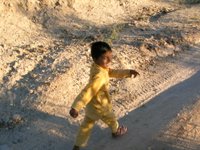I wrote an article for the Six Degrees News website. Six Degrees is an international development news website that focusses on grassroots reports. My article was about a government programme called Jal Yukt Shivar in Maharashtra. Here it is:
I’m excited about having done this. I’ve not been officially ‘published’ for a while now, if at all, though I guess there were opportunities at Arghyam that I’ve passed up due to other work. Six Degrees is founded by a friend, Binayak Das, so it didn’t require pitching from my side, and I didn’t get paid for it.
Whatever I do (if I do anything at all!) in the next phase of my life, I hope writing will be a part of it. This blog has been a source of great fulfilment but time to grow beyond it. And it would be good to be able to generate some income from writing.
I learnt some practicalities about journalism on the trip. One was the difficulty of really evaluating the success of a programme or initiative from a visit. Though I have a background in the water sector, I’m a generalist and not technically trained, so it was hard to really gauge. And for a large scale programme like this, unless you visit lots of locations, you can’t conclude anything with any degree of confidence. Your ideas about this will be appreciated.
Anyway, on the visit to Solapur in Maharashtra, based on which I wrote the article, I had the opportunity to meet the current District Collector. It happened quite easily, after a couple of phone calls, which was quite surprising. At Arghyam, it was really painful getting meetings with IAS officers. He was a very cordial and a nice person. However the really interesting bit was about the previous Collector, Tukaram Munde. He really seems to be a larger-than-life person who managed to achieve spectacular results. I have some sense of administration from work at Arghyam, and this chap in my opinion is off the charts. The District Collector (or Commissioner as he is called in some districts) has a really difficult job. There’s just too much stuff, too many subjects to work on. There are around 30 government departments/programmes that he is the head for. The DC of Sholapur told me there are literally hundreds of committees that he chairs. Then there is the lack of good quality and quantity of HR to work with, including corrupt people. And unlike the private sector, you can't fire people easily. There are many restrictions and rules to getting work done, much less flexibility than in the private sector. There is the political system to be managed, which could be quite formidable. And in the first place, many of the programmes are ill-designed and ‘dead-on-arrival’. So I’d say, as far as serious impact is concerned, the DC is also for the most part, ‘dead-on-arrival’. However, Mr. Mundhe somehow managed to crack the system and actually get it to deliver. For the life of me, I cannot visualise how he did it. He is now head of Navi Mumbai district and making waves there too. A man to watch (and you can watch some of his exploits by searching on the web).
Back to the trip again. There is a ‘power’ element in the field trip portion of visits like these , the government staff down the line from the DC are very deferential. At the same time I also got the sense that they thought I did not understand the stuff, and were patronising. I also find it tiring to meet a large number of people in a short span - my comfort level certainly is in meeting fewer people and developing stronger connections with them.
I wonder where Jalyukt Shivar is going. There seem to be many issues with the scheme, much more so in other districts. But it also seems to have huge potential from the Solapur experience. This programme seems to have the tantalising potential to be the ‘Holy Grail’ for water security in drought-affected districts. But many a slip between the cup and the lip. At the same time some other large scale success stories are emerging from other districts like Dewas in Madhya Pradesh. Is there a trend here ? In the past, it was always about NGO models and touting them, but there were very few examples of successes at scale. Are we entering a tipping point where we get more and and more successes at scale. I fervently hope so.
An interesting side point is that Solapur district has 2 products with the GI (Geographical Indication) tag, Maldandi jowar and Sangoli pomogranate. Here is a full list of GI tagged products in India: https://en.wikipedia.org/wiki/List_of_Geographical_Indications_in_India
It seems this idea is taking off in India.
Some more photos from the trip below:
 |
| Check dams storing water |
 |
| Compartment bunds under construction |
















